| Listing 1 - 9 of 9 |
Sort by
|
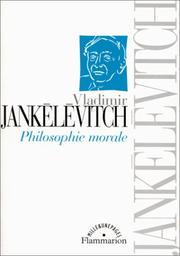
ISBN: 208067644X 9782080676443 Year: 1998 Publisher: Paris Flammarion
Abstract | Keywords | Export | Availability | Bookmark
 Loading...
Loading...Choose an application
- Reference Manager
- EndNote
- RefWorks (Direct export to RefWorks)
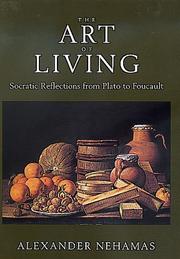
ISBN: 0520211731 9780520211735 Year: 1998 Volume: 61 Publisher: Berkeley : ©1998 University of California Press,
Abstract | Keywords | Export | Availability | Bookmark
 Loading...
Loading...Choose an application
- Reference Manager
- EndNote
- RefWorks (Direct export to RefWorks)
For much of its history, philosophy was not merely a theoretical discipline but a way of life, an "art of living." This practical aspect of philosophy has been much less dominant in modernity than it was in ancient Greece and Rome, when philosophers of all stripes kept returning to Socrates as a model for living. The idea of philosophy as an art of living has survived in the works of such major modern authors as Montaigne, Nietzsche, and Foucault. Each of these writers has used philosophical discussion as a means of establishing what a person is and how a worthwhile life is to be lived. In this wide-ranging, brilliantly written account, Alexander Nehamas provides an incisive reevaluation of Socrates' place in the Western philosophical tradition and shows the importance of Socrates for Montaigne, Nietzsche, and Foucault.Why does each of these philosophers―each fundamentally concerned with his own originality―return to Socrates as a model? The answer lies in the irony that characterizes the Socrates we know from the Platonic dialogues. Socratic irony creates a mask that prevents a view of what lies behind. How Socrates led the life he did, what enabled or inspired him, is never made evident. No tenets are proposed. Socrates remains a silent and ambiguous character, forcing readers to come to their own conclusions about the art of life. This, Nehamas shows, is what allowed Montaigne, Nietzsche, and Foucault to return to Socrates as a model without thereby compelling them to imitate him.This highly readable, erudite study argues for the importance of the tradition within Western philosophy that is best described as "the art of living" and casts Montaigne, Nietzsche, and Foucault as the three major modern representatives of this tradition. Full of original ideas and challenging associations, this work will offer new ways of thinking about the philosophers Nehamas discusses and about the discipline of philosophy itself.
Philosophy --- Conduct of life --- Ethics [Practical ] --- Levenswijze --- Mode de vie --- Morals --- Personal conduct --- Socrates --- Philosophers --- -Scholars --- Ethics, Practical --- Ethics --- Philosophical counseling --- Socrate --- Socrates Constantinopolitanus Scholasticus --- Conduct of life. --- -Conduct of life --- -Ethics, Practical --- Scholars --- Socrates. --- Sokrates

ISBN: 0415156254 0415156246 Year: 1998 Publisher: London ; New York, NY : Routledge,
Abstract | Keywords | Export | Availability | Bookmark
 Loading...
Loading...Choose an application
- Reference Manager
- EndNote
- RefWorks (Direct export to RefWorks)
17 --- 17 Filosofische ethiek --- Filosofische ethiek --- abortus (vrijwillige zwangerschapsafbreking) --- avortement (interruption volontaire de grossesse, IVG) --- Ethics --- General ethics --- 17 Moral philosophy. Ethics. Practical philosophy --- Moral philosophy. Ethics. Practical philosophy
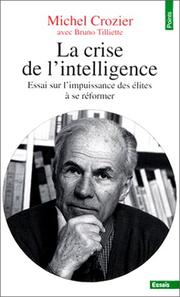
ISBN: 2020329069 Year: 1998 Volume: 361 Publisher: Paris Inter
Abstract | Keywords | Export | Availability | Bookmark
 Loading...
Loading...Choose an application
- Reference Manager
- EndNote
- RefWorks (Direct export to RefWorks)
Elite (Social sciences) --- Elite (Sciences sociales) --- 17 --- 330.1 --- -#SBIB:023.IO --- #SBIB:324H41 --- Filosofische ethiek --- Economische grondbegrippen. Algemene begrippen in de economie --- Politieke structuren: elite --- 330.1 Economische grondbegrippen. Algemene begrippen in de economie --- 17 Filosofische ethiek --- 17 Moral philosophy. Ethics. Practical philosophy --- Moral philosophy. Ethics. Practical philosophy --- -Elite (Social sciences) --- Elite (Social sciences) -
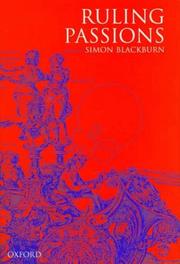
ISBN: 0198247850 0199241392 9780198247852 9780199241392 Year: 1998 Publisher: Oxford Clarendon
Abstract | Keywords | Export | Availability | Bookmark
 Loading...
Loading...Choose an application
- Reference Manager
- EndNote
- RefWorks (Direct export to RefWorks)
Ethics, Evolutionary. --- Practical reason. --- Ethics, Evolutionary --- Practical reason --- Practical rationality --- Practical reasoning --- Rationality, Practical --- Reasoning, Practical --- Reason --- Ethics, Naturalistic --- Evolutionary ethics --- Naturalistic ethics --- Ethical relativism --- Philosophical anthropology --- General ethics --- 17 --- Ethics --- 17 Filosofische ethiek --- Filosofische ethiek --- 17 Moral philosophy. Ethics. Practical philosophy --- Moral philosophy. Ethics. Practical philosophy --- Morale --- Raison pratique --- Philosophie analytique

ISBN: 0585329818 0520925513 9780520925519 9780585329819 0520211731 9780520211735 9780520224902 0520224906 Year: 1998 Volume: v. 61 Publisher: Berkeley University of California Press
Abstract | Keywords | Export | Availability | Bookmark
 Loading...
Loading...Choose an application
- Reference Manager
- EndNote
- RefWorks (Direct export to RefWorks)
For much of its history, philosophy was not merely a theoretical discipline but a way of life, an "art of living." This practical aspect of philosophy has been much less dominant in modernity than it was in ancient Greece and Rome, when philosophers of all stripes kept returning to Socrates as a model for living. The idea of philosophy as an art of living has survived in the works of such major modern authors as Montaigne, Nietzsche, and Foucault. Each of these writers has used philosophical discussion as a means of establishing what a person is and how a worthwhile life is to be lived. In this wide-ranging, brilliantly written account, Alexander Nehamas provides an incisive reevaluation of Socrates' place in the Western philosophical tradition and shows the importance of Socrates for Montaigne, Nietzsche, and Foucault.Why does each of these philosophers-each fundamentally concerned with his own originality-return to Socrates as a model? The answer lies in the irony that characterizes the Socrates we know from the Platonic dialogues. Socratic irony creates a mask that prevents a view of what lies behind. How Socrates led the life he did, what enabled or inspired him, is never made evident. No tenets are proposed. Socrates remains a silent and ambiguous character, forcing readers to come to their own conclusions about the art of life. This, Nehamas shows, is what allowed Montaigne, Nietzsche, and Foucault to return to Socrates as a model without thereby compelling them to imitate him.This highly readable, erudite study argues for the importance of the tradition within Western philosophy that is best described as "the art of living" and casts Montaigne, Nietzsche, and Foucault as the three major modern representatives of this tradition. Full of original ideas and challenging associations, this work will offer new ways of thinking about the philosophers Nehamas discusses and about the discipline of philosophy itself.
Conduct of life. --- Philosophers --- Scholars --- Ethics, Practical --- Morals --- Personal conduct --- Ethics --- Philosophical counseling --- Socrates. --- Socrates --- Socrate --- Sokrates --- Sokrat, --- Sokrates, --- Suqrāṭ, --- Su-ko-la-ti, --- Sugeladi, --- Sokuratesu, --- Sākreṭīsa, --- Socrate, --- سقراط, --- Σωκράτης,
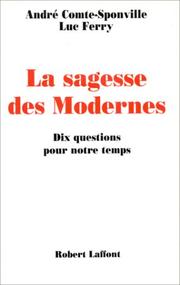
ISBN: 2221084071 9782221084076 Year: 1998 Publisher: Paris : Robert Laffont,
Abstract | Keywords | Export | Availability | Bookmark
 Loading...
Loading...Choose an application
- Reference Manager
- EndNote
- RefWorks (Direct export to RefWorks)
Ethics --- Ethiek --- Ethique --- Filosofie --- Philosophie --- Philosophy --- Wijsbegeerte --- Morale pratique --- Philosophy, French --- Ethics, Modern --- Conduct of life --- Wisdom --- Philosophie française --- Morale --- Sagesse --- #GGSB: Filosofie (20e eeuw) --- 17 --- Mental philosophy --- Humanities --- Deontology --- Ethics, Primitive --- Ethology --- Moral philosophy --- Morality --- Morals --- Philosophy, Moral --- Science, Moral --- Values --- 17 Filosofische ethiek --- Filosofische ethiek --- Philosophy and psychology of culture --- General ethics --- Philosophy. --- Ethics. --- 17 Moral philosophy. Ethics. Practical philosophy --- Moral philosophy. Ethics. Practical philosophy --- Filosofie (20e eeuw) --- 110 --- philosophie morale --- sagesse --- wijsbegeerte overige werken --- philosophie autres ouvrages
Book
ISBN: 213049272X 9782130492726 Year: 1998 Volume: 3380 Publisher: Paris : PUF - Presses Universitaires de France,
Abstract | Keywords | Export | Availability | Bookmark
 Loading...
Loading...Choose an application
- Reference Manager
- EndNote
- RefWorks (Direct export to RefWorks)
Sociology of culture --- Europe --- Courtesy --- Etiquette --- Social norms --- Politesse --- Savoir-vivre --- Normes sociales --- Conduct of life --- Courtesy. --- Désherbage --- Civility --- Courteous behavior --- Courteousness --- Discourteous behavior --- Discourteousness --- Graciousness --- Impoliteness --- Manners --- Polite behavior --- Politeness --- Rudeness --- Ungraciousness --- Ethics, Practical --- Morals --- Personal conduct --- Ethics --- Philosophical counseling --- Deselectie --- Conduct of life. --- Relations sociales
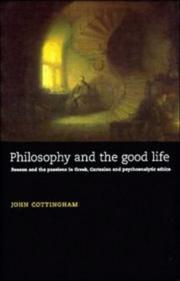
ISBN: 0521473101 0521478901 0511612230 0511007019 9780511007019 9780511612237 9780521473101 9780521478908 Year: 1998 Publisher: Cambridge : Cambridge University Press,
Abstract | Keywords | Export | Availability | Bookmark
 Loading...
Loading...Choose an application
- Reference Manager
- EndNote
- RefWorks (Direct export to RefWorks)
Can philosophy enable us to lead better lives through a systematic understanding of our human nature? John Cottingham's thought-provoking 1998 study examines the contrasting approaches to this problem found in three major phases of Western philosophy. Starting with the attempts of Plato, Aristotle and the Stoics and Epicureans to cope with the recalcitrant forces of the passions, he moves on to examine the fascinating and hitherto little-studied moral psychology of Descartes, and his effort to integrate the physical and emotional aspects of our humanity into a rational blueprint for fulfilment. He concludes by analysing the insights of modern psychoanalytic theory into the human predicament, arguing that philosophy neglects them at its peril if it hopes to come to terms with the complex relationship between reason and the emotions. Lucid in exposition and unusually wide-ranging in scope, Philosophy and the Good Life provides a challenging perspective on moral philosophy and psychology for students and specialists alike.
Philosophical anthropology --- General ethics --- Arts and Humanities --- Philosophy --- Ethics. --- Conduct of life. --- Reason. --- Emotivism. --- Ethics, Ancient. --- Psychoanalysis and philosophy. --- Psychoanalysis --- Moral and ethical aspects. --- Descartes, René, --- Conduct of life --- Emotivism --- Ethics --- Ethics, Ancient --- Psychoanalysis and philosophy --- Reason --- 17 --- Mind --- Intellect --- Rationalism --- Philosophy and psychoanalysis --- Ancient ethics --- Deontology --- Ethics, Primitive --- Ethology --- Moral philosophy --- Morality --- Morals --- Philosophy, Moral --- Science, Moral --- Values --- Emotive theory of ethics --- Ethics, Emotive theory of --- Ethics, Practical --- Personal conduct --- Philosophical counseling --- Moral and ethical aspects --- Filosofische ethiek --- Descartes, René --- Descartes, Renatus --- Cartesius, Renatus
| Listing 1 - 9 of 9 |
Sort by
|

 Search
Search Feedback
Feedback About
About Help
Help News
News